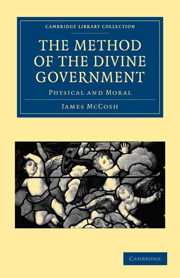Book contents
- Frontmatter
- Contents
- PREFACE TO FIRST EDITION
- PREFACE TO SECOND EDITION
- BOOK FIRST GENERAL VIEW OF THE DIVINE GOVERNMENT AS FITTED TO THROW LIGHT ON THE CHARACTER OF GOD
- BOOK SECOND PARTICULAR INQUIRY INTO THE METHOD OF THE DIVINE GOVERNMENT IN THE PHYSICAL WORLD
- BOOK THIRD PARTICULAR INQUIRY INTO THE PRINCIPLES OF THE HUMAN MIND THROUGH WHICH GOD GOVERNS MANKIND
- CHAPTER I MAN's ORIGINAL AND INDESTRUCTIBLE MORAL NATURE
- CHAPTER II ACTUAL MORAL STATE OF MAN
- CHAPTER III OTHER GOVERNING PRINCIPLES OF THE HUMAN MIND
- BOOK FOURTH RESULTS—THE RECONCILIATION OF GOD AND MAN
- APPENDIX ON FUNDAMENTAL PRINCIPLES
- REFERENCES TO AUTHORS AND SYSTEMS
CHAPTER II - ACTUAL MORAL STATE OF MAN
Published online by Cambridge University Press: 29 August 2010
- Frontmatter
- Contents
- PREFACE TO FIRST EDITION
- PREFACE TO SECOND EDITION
- BOOK FIRST GENERAL VIEW OF THE DIVINE GOVERNMENT AS FITTED TO THROW LIGHT ON THE CHARACTER OF GOD
- BOOK SECOND PARTICULAR INQUIRY INTO THE METHOD OF THE DIVINE GOVERNMENT IN THE PHYSICAL WORLD
- BOOK THIRD PARTICULAR INQUIRY INTO THE PRINCIPLES OF THE HUMAN MIND THROUGH WHICH GOD GOVERNS MANKIND
- CHAPTER I MAN's ORIGINAL AND INDESTRUCTIBLE MORAL NATURE
- CHAPTER II ACTUAL MORAL STATE OF MAN
- CHAPTER III OTHER GOVERNING PRINCIPLES OF THE HUMAN MIND
- BOOK FOURTH RESULTS—THE RECONCILIATION OF GOD AND MAN
- APPENDIX ON FUNDAMENTAL PRINCIPLES
- REFERENCES TO AUTHORS AND SYSTEMS
Summary
SECT. I.—SOME PECULIAR LAWS OF THE WORKING OP CONSCIENCE.
The two inductive methods of acquiring knowledge in physical science are observation and experiment. It has been doubted whether the latter can be employed in investigating the processes of the human mind, and it should at once be admitted that it requires certain modifications in order to suit it to the new object to which it is directed. Even in the physical sciences experiment in chemistry is somewhat different from experiment in mechanics, and experiment in physiology is different from experiment in unorganized bodies; and we must expect it to require some change before it can be applied to a spiritual substance. While it is most dangerous in some cases, and difficult in all, to experiment on the human mind, it may be safely and confidently asserted that experiment can be wrought upon it. We suspect that the poet Byron artificially put his mind in certain states with the view of calling forth those gloomy ideas and convulsive feelings which he has embodied in his poetry. Such experiments, it must be acknowledged, are very perilous, more so than those which Davy tried with inflammable gases, or than those which Halmemann, the founder of the Homoeopathic school of medicine, wrought upon the bodily frame, when he tried upon himself and upon a few friends those medicines which he adopted into his code.
- Type
- Chapter
- Information
- The Method of the Divine GovernmentPhysical and Moral, pp. 334 - 415Publisher: Cambridge University PressPrint publication year: 2009First published in: 1850



